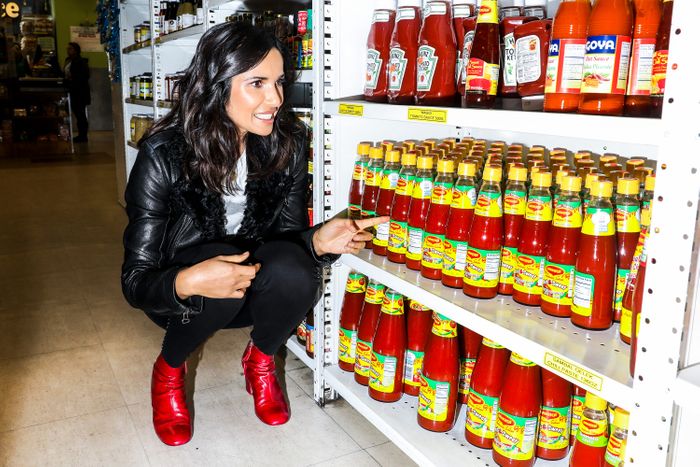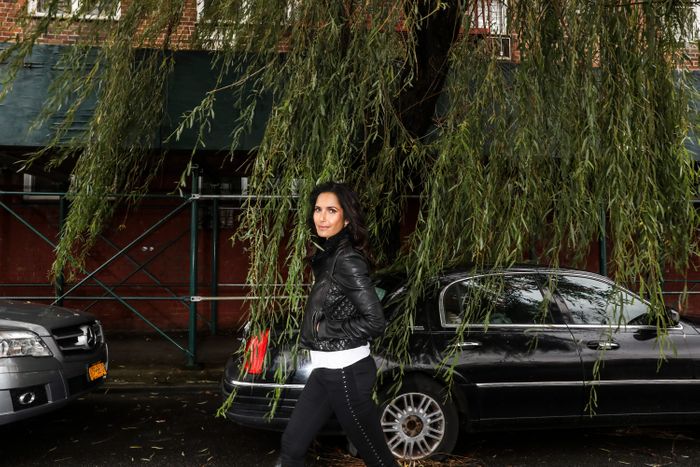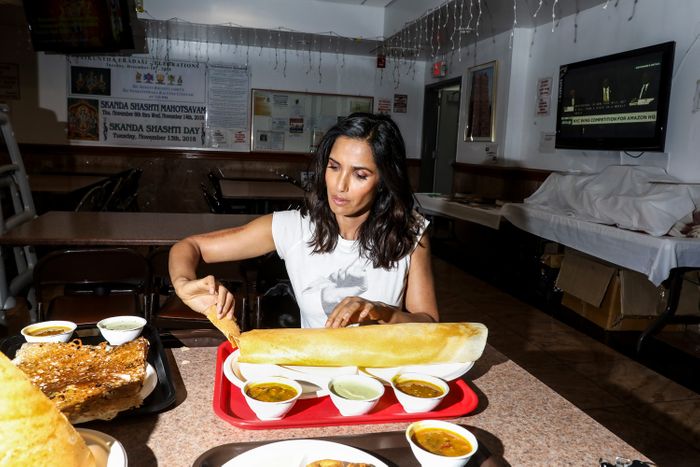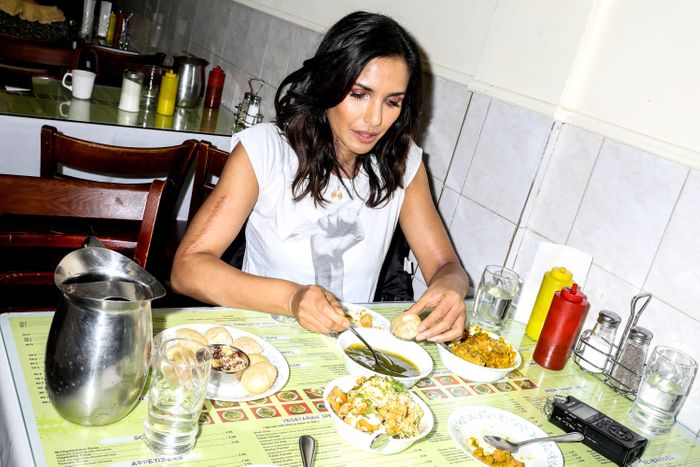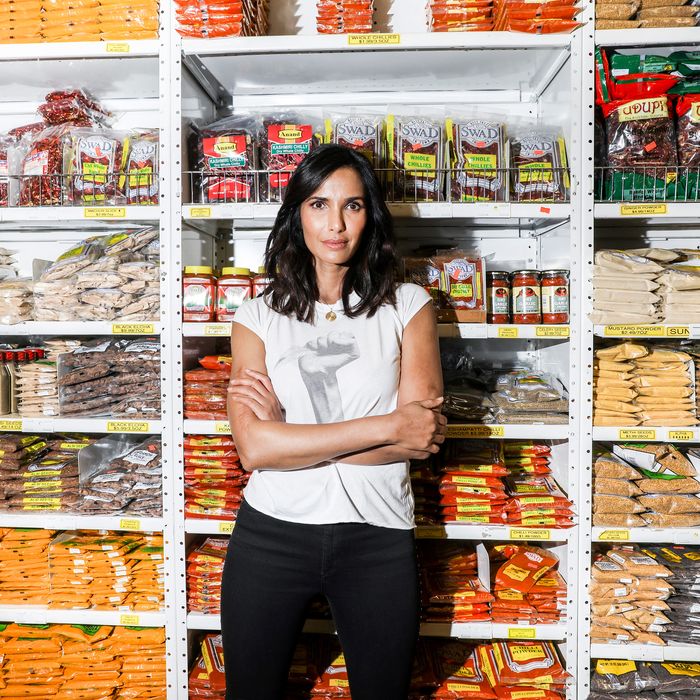
This story originally ran in January 2019. We’re republishing it today for the premiere of Taste the Nation With Padma Lakshmi on Hulu.
“I don’t expect you to love this,” Padma Lakshmi warns as she slides a red, plastic tray onto the Formica tabletop. “It’s fermented lemon pickles, so it’s a little bitter. It’s a really funky thing.”
We’re at stop No. 3 of Padma Lakshmi’s Very Excellent Food Tour: the Hindu Temple Society of North America in Flushing, Queens, which boasts the best flattop-griddled dosas this side of the Atlantic. If this were an episode of Top Chef, the category would be South Indian dish: There’s a mountain of dosas, including a dramatically cone-shaped one crisped in ghee, a green chili-studded rava dosa that looks like folded lace, puffy white jumbo idli, doughnut-shaped vada, and three different rice dishes — pulihora (tamarind rice), bisi bele bath (lentils and rice), and thayir sadam (yogurt rice). The last one, which she would eat as a kid in Chennai, isn’t like her grandmother’s — could it ever be? — but it’s “actually not bad!” Lakshmi nods approvingly as I scoop the yogurt rice up with the lemon pickle. A sharp fermented bolt spikes the back of my tongue. I feel like a fat, happy baby.
The temple started serving food over 20 years ago, but Lakshmi has been coming for puja ever since it first opened in 1977, when she was 6 years old. Back then, she lived nearby in Elmhurst. Now she lives in Soho with her 8-year-old daughter, Krishna, but she still stopped by the previous week to order four boxes of fresh jasmine garlands for a Diwali celebration she was hosting at her house. “I’ve gotten much more pious after they opened the canteen,” she laughs.
Weeks ahead of our afternoon, Lakshmi laid out a constantly shifting itinerary of what and where we should eat (more time, and we would have gone to An Choi for bánh mì); the temple was re-included after we had a smattering of chaat at Maharaja — North Indian snacks, or “real stoner food” as Lakshmi calls it. “I had to really make some very deep Sophie’s choices about where I should take you,” she explains.
We begin on a rain-slicked November day at the one-stop grocery store Patel Brothers in Jackson Heights, where she skims the aisles in chunky red boots and a leather jacket — a striking contrast to the neighborhood aunties doing their morning shopping — pausing to lecture on everything from neem-infused beauty products to the wall of leguminous plants to a produce aisle tumbling with snake gourds and green mangoes. The mangoes, she explains, can be used in a southern curry served at Hindu weddings; in the north, they’re sprinkled on top of chaat; still, they’re sun-dried and pulverized into a sour powder known as amchoor, which is the secret weapon in her fried chicken. (Dinner guest Chris Rock loves it.)
The entire food tour, with a driver and her assistant, Anthony, on hand, is a flex, and why not? Lakshmi has gamely played the role of culinary ambassador, a conduit between India and the West, for years. Her first two cookbooks — Easy Exotic: Low-Fat Recipes From Around the World and Tangy, Tart, Hot and Sweet: A World of Recipes for Every Day — were about making “global” food accessible for Americans. “People are so into turmeric and ginger and all of that. It’s been very gentrified and hipsterized,” she says as we pass stacks of 25-pound jute sacks of jasmine rice and atta flour. “If it opens Americans to new flavors and ingredients that are more natural and healthy, that’s fine. I don’t care about cultural appropriation. I really don’t.”
“So this is a pet peeve of mine: the chai conundrum,” Lakshmi says as we hit the tea section, noting that when people say “chai tea” they’re saying “tea tea.” “Anthony, can you please make sure we buy some?” (Anthony informs her that he already got some last Saturday.)
“Oh, this is a moment here.” Lakshmi crouches in front of the big, red holsters of Maggi Hot & Sweet Sauce, which she describes as the “Heinz of India,” a cross between ketchup and hot sauce. “It’s the WD-40 of my house. You can’t eat eggs in a home without it.”
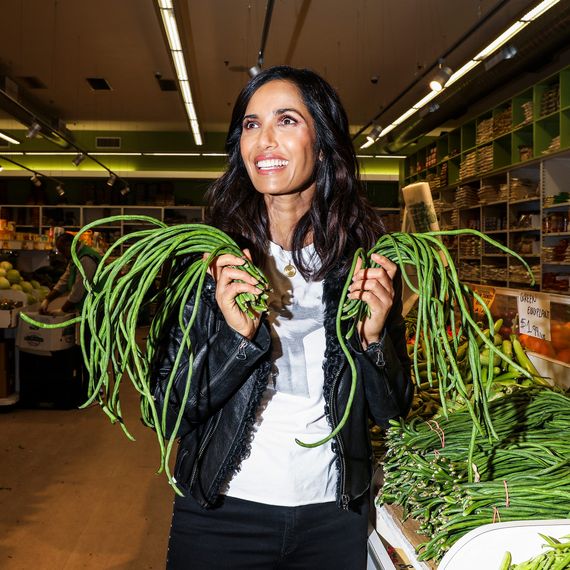
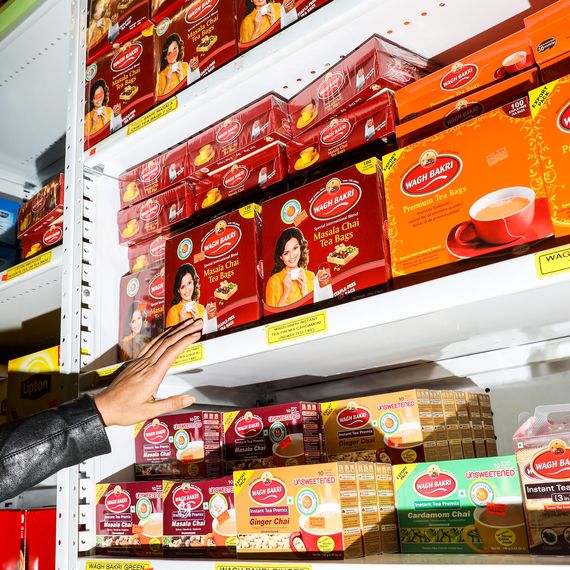
Lakshmi knows a lot about food, which should be obvious given that she’s written three books about it, including her most recent, 2016’s The Encyclopedia of Spices & Herbs, but the mantle of expertise hasn’t always been granted her. Part of this is what it means to be a former runway model looking to be taken seriously as a writer and cook. “I recently was talking to David Chang about that,” she says. “He came to my house to do a little segment for his show [Ugly Delicious], and he wanted Indian food broken down 101. He was like, ‘I’ve known you for years. Why have we never talked about this ever?’ I just said, ‘I don’t know. Because it never comes up.’”
In a New York Times review of the second season of Top Chef that still rankles her, Frank Bruni criticized her outfit changes and described her as such: “Padma Lakshmi, a.k.a. Mrs. Salman Rushdie, a model-turned-actress whose epicurean musings are less riveting than her sluggish, mouth-full-of-molasses style of speech and strenuously come-hither poses.” If the trope of the beautiful woman eating food sits uneasily, though, it’s still one she’ll leverage. Just take her cheeky 2009 Carl’s Jr. commercial for the Western Bacon Six-Dollar Burger. “Food is sexual, so I’ll stand by my goddamned commercial. I don’t care!” Lakshmi says firmly. On the Bravo cooking competition Top Chef, currently airing its 16th season in Kentucky, Lakshmi’s role is often to keep the plot moving, describing the challenges and eliciting opinions from guest judges. “In order to do my job well as a host,” she says, “sometimes that means sublimating my own personality to make sure that we hear from all of the other judges as well as the chefs.”
Lakshmi is aware of misperceptions surrounding her — it’s the kind of trade-off she’s been navigating her whole life. She thought modeling was intellectually meaningless, but it freed her from student loans; she values her beauty, but has felt alienated from it; she lives in a stratosphere of celebrity, but wants to maintain her roots as an Everywoman. “It is something that I have struggled with a little bit because I feel like sometimes there is a real dichotomy between what most people in this country know me for and what I’m really like,” Lakshmi explains. “I’ve had to just say, Well, this is just the way that I make my living. So be it.”
The immigrant spirit of making do is true for much of Lakshmi’s life, which has enough dramatic twists and turns to fill a book; indeed, she details much of it in her lovingly written memoir, Love, Loss, and What We Ate, published in 2016. Lakshmi, 48, was born in Delhi, and when she was still a baby, her mother left her father, an abusive, philandering husband, in spite of the social stigma of the time. She moved to New York for a career in nursing, sending for her daughter when she was 4 years old. Lakshmi went back and forth between India and New York through the years, before they settled out west in California.
As we drive along Grand Central Parkway to the temple, Lakshmi points out the rain-speckled window toward a pair of brown, LeFrak-style buildings in Elmhurst, where she lived as a little girl. She wants to take a detour. Lakshmi can still recite the address from memory, but the numbers have changed over the decades, so eventually, she gives the driver manual directions: left here, a right there. She remembers playing in a field outside when she was young, but when we arrive, the field is just a patch of grass by the off-ramp.
“Well, when you’re 7 it feels like a field!” she laughs, as we get out of the car and start walking uphill. We stop in front of the building, which still bears the mark of her old address — a remnant of the ’70s, like the scar over her right eyebrow from the time a kid threw a brick at her.
“That’s where I was molested,” she says flatly, looking up at a two-bedroom apartment wrapped around the corner; a blue tarp on the balcony crinkles in the wind. In a brief page in her book, she describes how her stepfather’s brother touched her genitals while she was asleep, and put her hand on his when she was 7 years old. That’s when the insomnia began. She told her mother what had happened, who then confronted her stepfather. He didn’t believe her. So the next week, she was on a plane back to India to stay with her grandparents. “Memory is curious,” Lakshmi says, turning back, hands jammed into her pockets.
“My mom did the best thing she could, and she didn’t know how to kick her brother-in-law out of the house. So she sent me to somewhere she thought was safe, which was her parents’ home,” Lakshmi explains. But as a child, it felt different: She had slipped through her safety net. “In doing that, she sent me a very powerful message that I have carried in my heart for the rest of my life. When that happens to you, it really marks you as a young child, and you can never get that confidence back.”
Back in the car, Lakshmi turns on the seat warmers and instructs the driver to continue on. “It’s always funny to me when people think I’m so posh. I’m not saying I’m not now,” she says. “I’m totally a big, fat, comfortable lady! But I didn’t start that way. My poshness is totally self-built.” If there’s something that defines Lakshmi’s outlook, it’s been this ability to look at the darker corners of her past, but not stay in them. It’s the same reason she avoids talking to her father, whom she didn’t meet until she was an adult and has only spoken to a handful of times. She sort of doesn’t see the point. “That self-adjustment has been hard-won. I’m not looking to jeopardize it,” she says. “I want to be pulled forward, not held back, by my past.”
Much of that has to do with her daughter, Krishna. Lakshmi is a proud parent, and on the drive, she pulls out her phone to show me videos of Krishna singing Carnatic music, which she describes as a kind of call-and-response prayer. Her daughter also takes piano, ukulele, and modern dance lessons, and was recently elected the student-council rep for her third-grade class. In some ways, she has the childhood a 7-year-old Padma could have only dreamed of.
“It’s so funny to me when I look at Krishna because I always wanted green eyes and white skin when I was little, and now I have this baby who is like that but has my bone structure. I just expected her to come out brown,” Lakshmi says, laughing. “Then my family would joke, ‘Well, she might crisp up as she gets older!’”
As a teenager, classmates taunted Lakshmi, calling her “black giraffe.” She felt awkward and insecure about her tall, brown girl body. “I think about those people,” she muses. “I was bullied by this girl and her name is always on the tip of my tongue every time I do a late-night show. I always feel like calling her out. Where are you?”
Lakshmi returned to New York after her mother’s marriage with her stepfather dissolved; they eventually moved to Arcadia in the San Gabriel Valley, which she absolutely hated. She left as soon as she was able — back east to college at Clark University, and then to Spain her senior year, where she soon got work as a fit model through a friend. Within a couple of years, Lakshmi caught her big break: Helmut Newton, the provocative high-fashion photographer, wanted to take her picture. Suddenly, all of the physical things that she was insecure about — her brown skin, a long, keloidal scar running down her right arm from a traumatic car accident in high school — became commercial assets, part of her “look.”
“It was only because Helmut Newton happened to find me and happened to love scars that all of a sudden everybody wanted me for their fashion shows, and everyone wanted me in short sleeves, so you could tell it was me,” she reflects, tearing off a piece of the voluminous dosa. “It took another person who had power to look at me another way, to give me permission, that that was even available to me.”
Modeling offered her a conditional existence, where she was valued, but maybe not taken seriously. Still, Lakshmi reasoned, it was a practical move. She could pay off all of her student loans while traveling the world — Morocco, the Seychelles, Bali. “I was starting to make a shit ton of money like I’d never seen,” Lakshmi recalls. “But I don’t think I was very happy because in my heart I really wanted to be a writer. I would judge myself like, You’re doing something so vapid; you’re not using your brain. And then I would be like, Get over yourself. You’re lucky to be doing what most people would kill to do. Just stock your money away and be thankful.”
“When you are a model and you derive your living from your body, it’s devoid of any of your own identity, so it’s hard to have any self-esteem,” Lakshmi adds matter-of-factly. She picks up a tray and tosses out a half-demolished dosa. “Ready to move on? Okay.”
The crowd at the temple is deeply invested in Lakshmi in that familiar, immigrant way where religious centers double as gossip hot spots. A group of aunties clad in silk saris huddle in to ask for a photo with her; so do the workers in the kitchen and a newlywed, who tells her that she loved her book. Before we leave, a busybody asks how her ex-husband, the novelist Salman Rushdie, is doing. Lakshmi laughs it off and replies, “I divorced him ten years ago!” before walking away.
Even in her memoir, she limits her marriage to Rushdie to the first two chapters, which, of course, were the parts the media focused on. As she writes, Rushdie wanted to meet Lakshmi, then 28, after seeing a photograph of her in a magazine. She was taken by his attention and stature; he represented the intellectual life she craved. During the good times, they traveled the world, attending galas and awards ceremonies, and regularly hosting dinners for the likes of Susan Sontag, Don DeLillo, and Paul Auster. But Lakshmi’s own aspirations grew as she entered her 30s, and their relationship struggled. Eight years later, Rushdie might still be the same man she had met when she was 28, but she was no longer the same woman. She had been a constant ego massager. Lakshmi began to feel herself slipping away.
“I think you’re attracted to what you admire,” Lakshmi says slowly. “I was always seeking out mentors, and for better or worse, he was a really big mentor to me. He did help my writing. I had an in-house editor who was better than I could ever have imagined. But at some point, I needed to be my full self, and my illness brought that to an acute point where I would have either drowned or left.”
For years, without knowing it, Lakshmi had suffered from endometriosis, a painful, often undiagnosed condition where the uterine lining grows outside of the uterus, which can inundate internal organs with blood. Toward the end of their relationship, she was in greater pain, and they had less sex. She felt like her own body was turning against her. “I was working against an invisible monster I didn’t know existed,” she says. “Once I stopped fighting against my body because we determined the problem, I was like, Oh. My body’s not my enemy.”
After her diagnosis, Lakshmi began to redefine her relationship with her body. Her forays into activism in the past decade — co-founding the Endometriosis Foundation of America and becoming an ACLU ambassador — have been part of that. Comedy has, too. She’s become a zippy presence on Twitter, livetweeting Top Chef and making fun of Stephen Miller’s hairline. In October, Lakshmi hosted a charity fundraiser at the Bell House in Brooklyn, packed with queer and female comics. The show raised money for Movement Voter Project ahead of the midterm elections, but it was also a timely rejoinder against the Comedy Cellar and its support of Louis C.K. She opened the two sold-out shows with a simple statement: “Fuck Louis C.K.” “Everytime I speak out about something, I feel released, and I feel more in my body,” she smiles.
The month before, as the country was roiled by the Senate confirmation hearings of Brett Kavanaugh, Lakshmi wrote an op-ed for the New York Times about the time she was raped by an older boyfriend at the age of 16. “I’m happy that I did it, but I think I did it in the most violent way. I’m still very shaky about it,” she says. “It was a really deep, dark, secret, and it was a very public self-flaying. But I was so incensed by what was going on, and I thought I would regret it if I didn’t say something. It was such a fast decision.” The week the piece went live, women stopped her on the street, tears brimming and grateful; Lakshmi would spontaneously burst into tears. “When you push something down for 32 years, you get really good at it,” she reflects. “But then once you open it, it’s hard to control it and put the genie back in the bottle.”
Harvey Weinstein was “another episode, in a long line of episodes.” Miramax Books published Lakshmi’s first two cookbooks — Easy Exotic and Tangy, Tart, Hot and Sweet — and he’s a presence throughout a 2007 profile of Lakshmi in Vanity Fair. I ask her if anything ever happened with him. “I knew enough to keep somewhat of a distance, but I wasn’t spared. My experience wasn’t as bad as Annabella [Sciorra]’s or any of those ladies, but I also wasn’t acting in his movies,” she says, declining to go into specifics. “I think we need to move on from him.”
On the way to our next stop, we drive past her old apartment building. “There it is again,” she says. “I pass that building every time I go to JFK, and I’m glad I pass it because it makes me thankful. It told me that all the shit that girl in that apartment went through, at least that could be worth something. There could be some sense to be had out of it [rather] than a random bad thing that happened to that child. The hardest things in my life have also been the things that have taught me the most and given me the most confidence in my life, because I’ve been through them and come out the other side.”
At Maharaja, the chaat restaurant, Lakshmi orders one of each item in a mix of English and Hindi. “My head bob will go away as we enter back into Manhattan,” she laughs.
Our table begins to accumulate a variety of crunchy, cool, and tangy street-food snacks, including her favorite, pani puri, which you have to assemble yourself. “I’m going to show you how to do one. You want to get a video of this?” she asks Anthony as she picks up a puri, a small, crisp hollow ball; expertly punctures it with a manicured pinky finger; fills it with black chickpeas, potatoes, and a little bit of chutney; dunks it in a mint-green water (or “swamp water”); and pops the whole thing into her mouth — all while narrating the process — like a tidy magic trick.
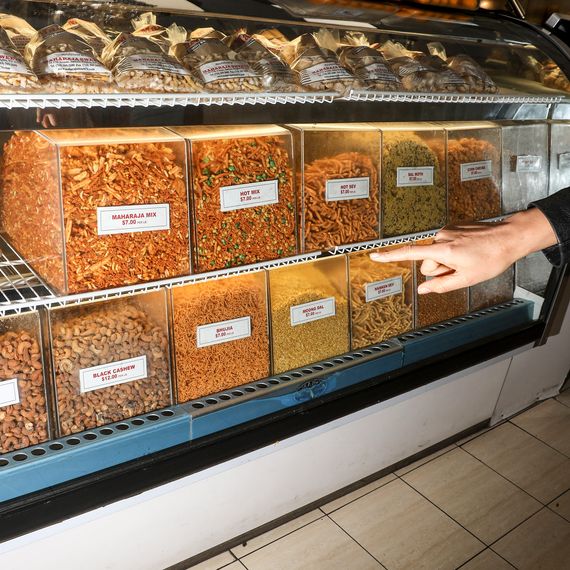
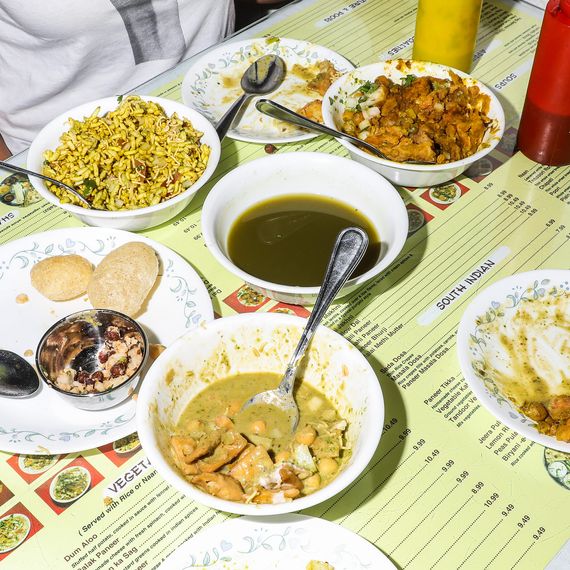
There’s still a heap of food left over, but Lakshmi is good at knowing when to move on. At every stop, she shows magnificent restraint, eating the way she does on Top Chef, which is to try a little bit of everything. Unlike the other mainstay judges, like Tom Colicchio or Gail Simmons, Lakshmi has to eat every single dish the contestants make because she judges all of the Quickfire challenges. She might gain around 15 pounds per season, which makes the pressure to look beautiful that much more difficult. By now, she has a routine. Throughout production, she drinks what she calls “Cranberry Drano” (there’s a recipe in the memoir) — a mix of unsweetened cranberry juice and green tea with spoonfuls of powdered fiber and vitamin C — and goes on a diet afterward (“no wheat, no meat, no sweets”) to maintain the illusion of consuming all that food without appearing to gain any weight.
As we head toward our last stop, threading through the crowds of Chelsea Market toward Los Tacos No. 1, our bellies are full, but not bursting. Everything we’ve eaten today — the dosas, chaat, tacos, even pizza — is homey, mostly brown-people food. That is to say, there are no white tablecloths or hand-wringing, service-obsessed stops on the itinerary — a departure from the kind of food privileged on Top Chef, where contestants roll in with James Beard Awards and résumés at kitchens run by Eric Ripert and Colicchio. “Fine dining, for most of the professional food world, has revolved around a canon that’s been established by mostly dead French white men,” she says. “It’s restaurant food. It’s not home cooking.”
Before Lakshmi joined Top Chef, she had pitched Bravo a show that would feature conversations with interesting people around a dinner table, not unlike the ones she holds at her own home. (Hosting salonlike dinners is a favorite pastime of hers, and many creative heavyweights have broken bread at Lakshmi’s house, including Kehinde Wiley, Zadie Smith, and Susan Sarandon.) But Bravo was developing Top Chef, and the network wanted her to host that instead. Lakshmi had a conflict on the first season (hosted by Katie Lee Joel) and came aboard for the second.
“Honestly, I never thought it would last this long. I needed to help my cookbook!” Lakshmi says, of why she joined in the first place. Now, she plans to do Top Chef until it’s over. “I feel a great proprietorship over the show,” says Lakshmi, who became an executive producer in 2013. “Top Chef is wonderful because I can sit on my ass and talk about food all day long, and it pays for the lifestyle that my daughter and I enjoy.”
Other than that, Lakshmi is focused on writing another book. “I want to be left alone, in my writing room, to scribble away or read,” Lakshmi says. She’s in a relationship with Krishna’s father, Adam Dell, but they live separately, and she has no desire to marry again. As she gets older, she predicts she’ll become “more reclusive and inward.” But these days, she still relishes the social calendar. Lakshmi tells me about how Mayor Bill de Blasio is honoring her as part of a Diwali celebration at Gracie Mansion. “Somebody should tell the mayor that Diwali is gone,” she laughs. “I was kind of irritated that he wanted to recognize me as a good citizen of New York on Diwali because I’m Indian. He couldn’t just ‘recognize me’? On the other hand, I’m going to regret it if I don’t do it, so I just have to show up.” And she did, in a simple black dress and bindi, where she gave a speech about Indian-American identity, and joked about how she had her first kiss behind Gracie Mansion.
Lakshmi orders two tacos each for us — nopales and al pastor — and a horchata. The winter sun is sliding into dusk by the time we leave and begin to wind past the storefronts of the Village back to her house. On the way, she gets a text from Aziz Ansari asking if she’s around for dinner tonight or tomorrow. “Sure,” Lakshmi texts back, turning to Anthony. “What am I doing tomorrow night?” she asks. “Nothing. Please tell me nothing.” (Nothing.) Tonight is no good, she replies, but tomorrow works. In a couple of hours, she’s set to co-host a dinner at Indochine for Lisa Borders, the new CEO and president of Time’s Up. “There’s always some beautiful event to go to, like Women of the Year last night,” she says.
Still, the time between shooting seasons of Top Chef gives her more time to write. Her book proposal is due in less than two weeks. She won’t tell me what it’s about; instead, she decides to tell me about a dream project she recently scrapped — an 18-page book pitch about immigrant food. The idea was to travel to ethnic pockets around America to see how various immigrant communities have cooked food, and ultimately, made a home. She spent several months developing the idea, until she realized the extended travel it would require came at too big a cost.
“In ten years, I’m not going to look back and say, Oh, look at all these beautiful projects I’ve done. I’m going to say, Was I there for Krishna?” she says in the quiet dark of the car. “So, do I have it all? Yes. Do I have it all, like I want it, at once? No.”


